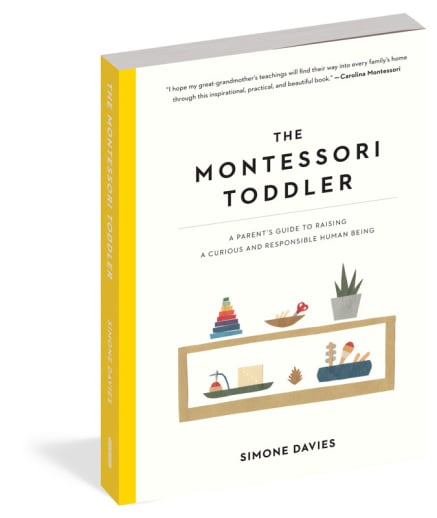The Montessori method has long been a popular learning method, particularly for preschools. Cultivating the whole child, this approach utilizes their intrinsic curiosity, developing a dynamic relationship between the child, adult, and the learning environment. Sounds like many a home school to me! This resource provides the knowledge you'll need to implement the method with your own preschooler. The undergirding philosophy is explained simply and sufficiently. You'll find strategies categorized and explained in a user-friendly way and a wealth of practical application via concrete lists and nugget-sized explanations. Concepts such as creating a rich, safe learning environment; nurturing and communicating; setting limits and consequences, and handling emotional challenges such as shyness, conflict, and even divorce. For a Montessori approach raising children, this one's a must have! Includes a bibliography of additional readings, resource and activity lists, information on Montessori schools, play-dough recipe, and two charts (one assists parents in retraining their conversations with children; the other helps identify feelings). Includes an attached dust jacket. 248 pgs, pb. ~ Ruth
Montessori Toddler
SKU
051908
ISBN
9781523506897
Grade AD
These icons are designed to help you quickly understand and learn important information about our products.
Teaching Method
Traditional
Teacher-centered curriculum commonly used in classrooms that may include a text, teacher manual, tests, etc.
Charlotte Mason
A methodology based on the work of a 19th century educator who maintained that children learn best from literature (Living Books), not textbooks.
Classical
A methodology based on the Latin Trivium (three stages of learning), including the grammar stage (memorization and facts), logic stage (critical thinking), and rhetoric stage (developing/defending ideas).
Unit Study
A thematic or topical approach centered around one topic that integrates multiple subject areas.
Montessori (Discovery)
A methodology based on the work of a 20th century educator that emphasizes student and sensory-driven discovery learning and real-life applications.
Other
Other methodologies
Religious Content
Secular
Contains content contrary to common Christian beliefs (i.e. evolution).
Neutral
Avoids religious or theoretical topics or presents multiple viewpoints without preference.
Christian/Religious
Faith-based or including instructional religious content.
Learning Modality
Auditory
Learns through listening, talking out loud or reading out loud.
Visual
Learns through seeing, prefers written instructions and visual materials.
Kinesthetic/Tactile (Hands-On)
Learns through moving, doing and touching.
Multi-Sensory
Curriculum that employ a variety of activities/components.
Presentation
Sequential
Curriculum progresses through well-defined learning objectives. Emphasizes mastery before moving to the next topic.
Spiral
Topics and concepts are repeated from level to level, adding more depth at each pass and connecting with review.
Conceptual/Topical
Focus is on the “why,” often with a unifying concept as well as specific skills; coverage may be broader.
Teacher Involvement
Low Teacher Involvement
Student-led materials; parent acts as a facilitator.
Medium Teacher Involvement
A mix of teacher-led time and independent student work.
High Teacher Involvement
Teacher-led lessons; may utilize discussions, hands-on activities and working together.
Additional Materials Required
No other materials needed
Everything you need is included.
Other Materials Required
There are additional required resources that are a separate purchase.
Other Materials Optional
There are additional resources mentioned or recommended but are not absolutely necessary.
Consumable
Consumable
Designed to be written in; not reusable.
Non-Consumable
Not designed to be written in; reusable.
Our Price
$19.99 $19.99 $9.68
Rainbow Savings: $10.31
Description
Publisher's Description of Montessori Toddler
It's time to change the way we see toddlers. Using the principles developed by the educator Dr. Maria Montessori, Simone Davies shows how to turn life with a "terrible two" into a mutually rich and rewarding time of curiosity, learning, respect, and discovery.
With hundreds of practical ideas for every aspect of living with a toddler, here are five principles for feeding your child's natural curiosity, from "Trust in the child" to "Fostering a sense of wonder." Step-by-step ways to cultivate daily routines with ease, like brushing teeth, toilet-training, dealing with siblings, losing the pacifier.
Plus learn how to:
- Stay composed when your toddler is not and set limits with love and respect—without resorting to bribes or punishment
- Set up your home and get rid of the chaos
- Create Montessori activities that are just right for your one-to-three-year-old
- Raise an inquisitive learner who loves exploring the world around them
- See the world through your toddler's eyes and be surprised and delighted by their perspective
- Be your child's guide—and truly celebrate every stage
Details
| Product Format: | Paperback |
|---|---|
| Grade: | AD |
| Brand: | Workman Publishing Company |
| ISBN: | 9781523506897 |
| Length in Inches: | 9.375 |
| Width in Inches: | 6.625 |
| Height in Inches: | 0.875 |
| Weight in Pounds: | 1.4 |
Videos
Reviews

